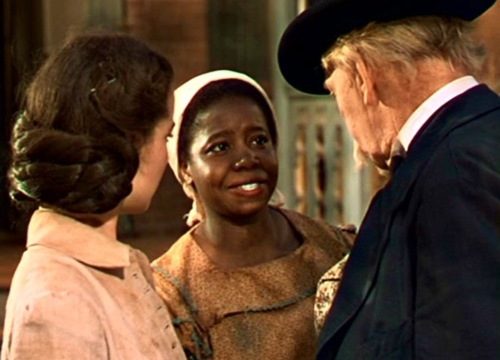Apparently, a pair of bus security guards for Greyhound mistook her for a pickpocket in 1979 and threw her onto a bench hard enough to injure her ribs. And all I can think—and honestly, I don’t think she would’ve disagreed—is that subduing a sixty-eight-year-old woman that way would have been unnecessary even if she had been a pickpocket. Especially since IMDb lists her as having been 5’1″, and that’s presumably before she—as people do—started shrinking in her old age. How hard did they think it would have been to subdue her?
She was born Thelma, a name she apparently hated. Her background was well off enough so that she seems to have seriously considered being a nurse until a teacher suggest she try acting. She became a dancer, then went to Hollywood to act. She was frustrated enough with the limitations there that she moved on to TV acting then quit altogether; she held a wide range of jobs over the years, but she was only in thirteen movies over her career. In fact, she went back to Thelma at some point because she didn’t want people to only think of her from her film career.
Which, let’s be real, means Prissy. Prissy is, for the most part, an awful, thankless role. I like Gone With the Wind, but oh my goodness. I saw an interview with her once (I think it’s on my DVD of the movie) where she observed that a kid had once written her saying how awful it was that everyone’s always hitting Prissy and she said, no, Prissy deserved it and she often wanted to hit her as well. Which, you know, yeah. I’m pretty sure the only two characters who interact with her in the book for any length of time without hitting her are Careen and Melanie. I’m not saying it’s right, especially since Prissy couldn’t hit anyone back, but I’m saying the impulse is understandable. In the book, her mother literally chases her across a field with a cotton stalk to beat her with it to stop her whining.
The problem, of course, came when there wasn’t much more possible for her career than Prissy. I won’t lie—part of it was her voice. She had a naturally high-pitched voice that I don’t think would have worked for a lot of characters. On the other hand, the rest of it was that she was black. She, like Hattie McDaniel, wasn’t allowed to go to the premiere of the movie, because again, black. Segregated theatre. Though I will say that we talk a lot about Hattie McDaniel’s feelings on the subject and I have literally no idea what McQueen thought, because she disappeared so thoroughly from Hollywood that she was seldom even interviewed.
An interesting might-have-been is that one of the things she did after leaving Hollywood was go to New York City College and acquire a Bachelor’s in political science in 1974. Granted, yes, she was 64 and basically of retirement age. But man would she have been an interesting person to have in your brain trust about social issues to do with race in the film industry, huh? I mean, if anyone cared enough to do that sort of thing in 1974, which they didn’t. Instead, she ended her days living in a cottage in Augusta, Georgia, and died of burns sustained from dealing with a kerosene heater in her home. Also, she apparently felt the opposite of Hattie McDaniel and would rather be a maid than play one. So at least once, she did.
Now that you know more about Butterfly McQueen than you realized there was to know, consider supporting my Patreon or Ko-fi!

